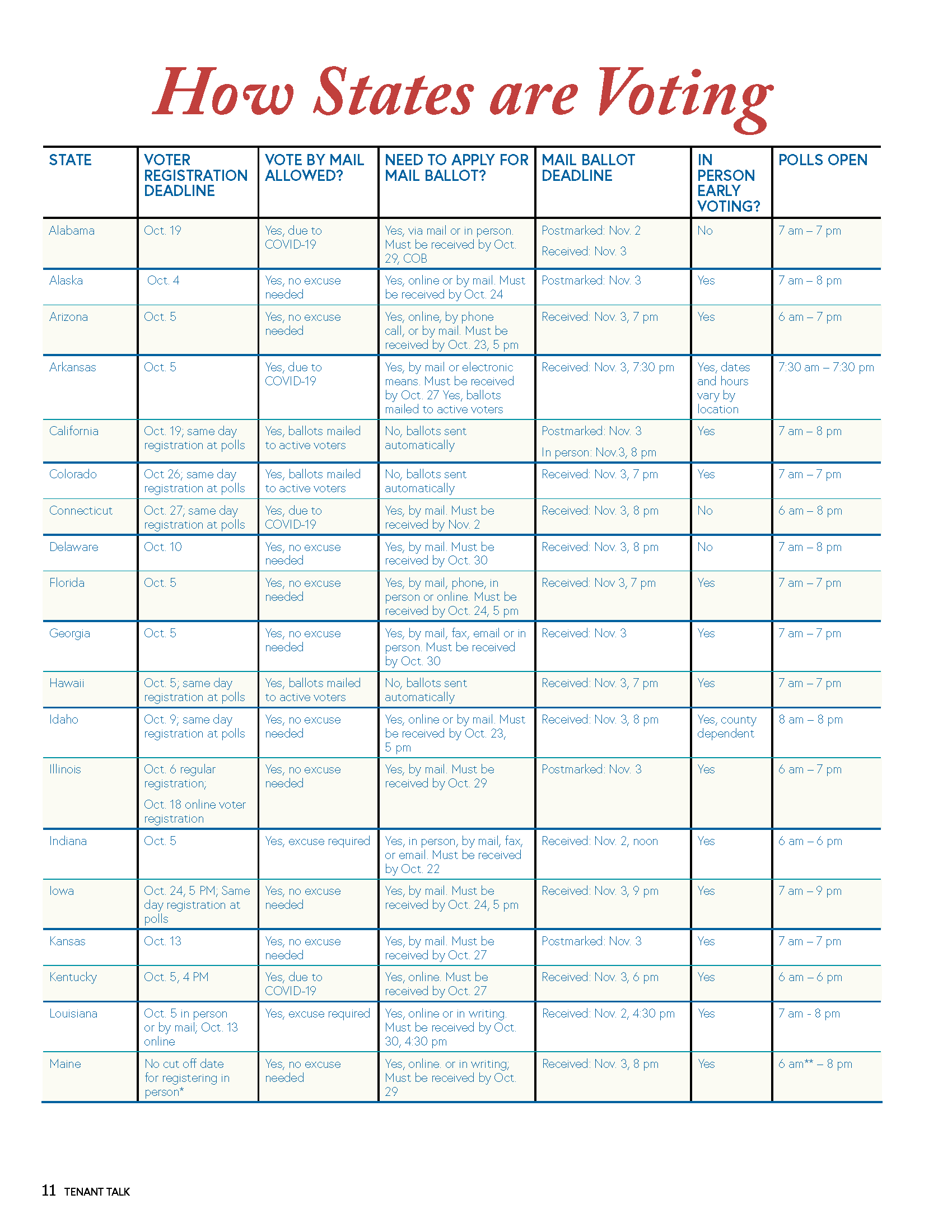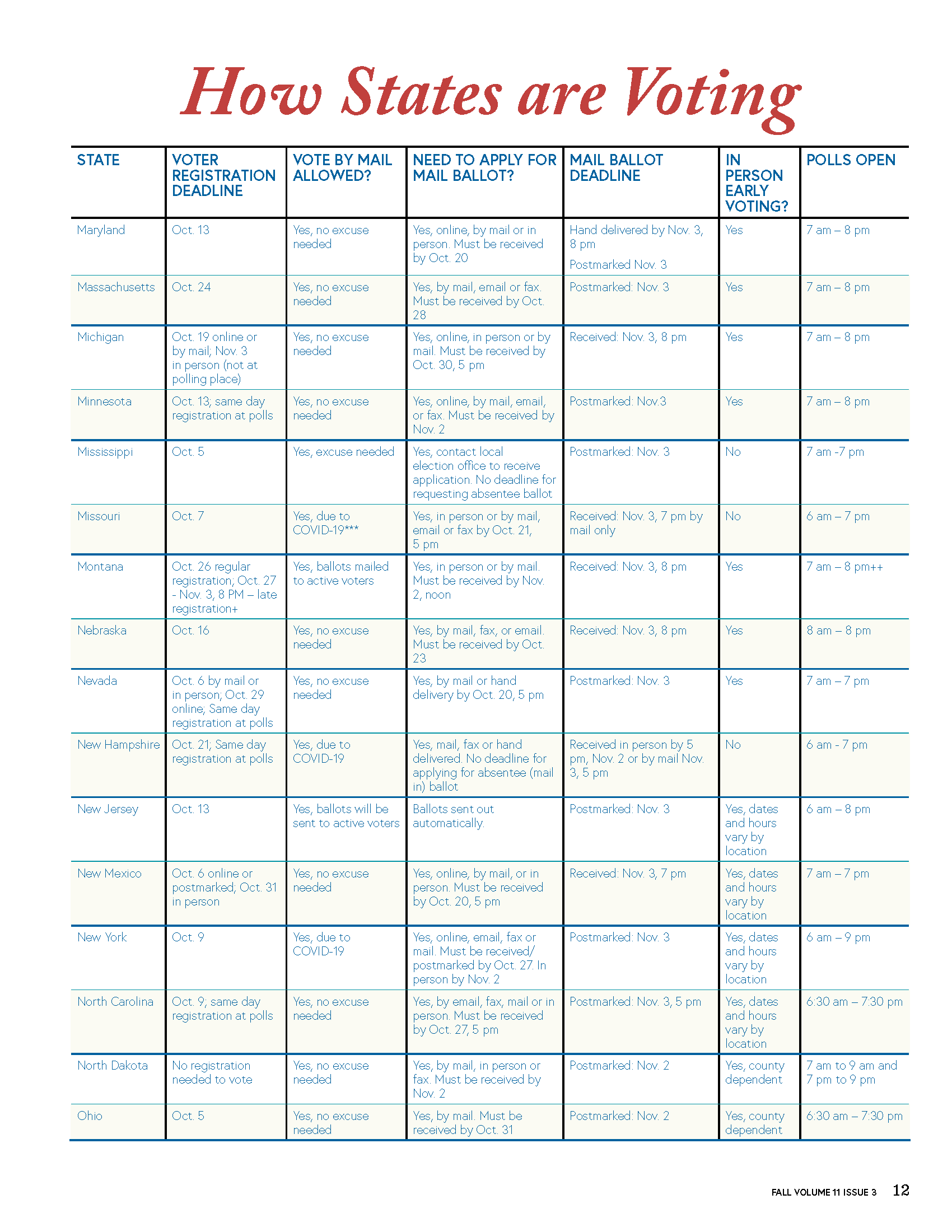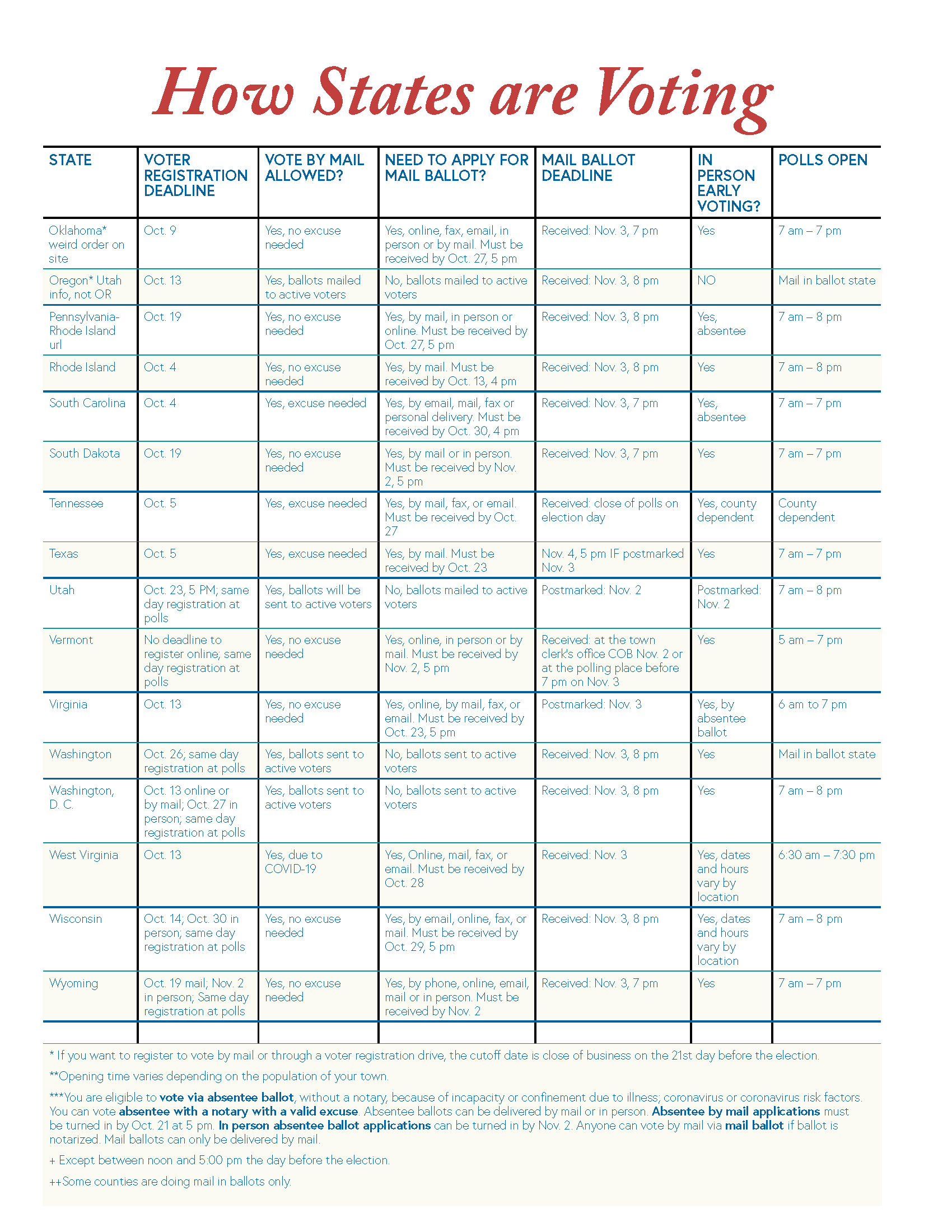Voting Laws in your Own State
One of the most significant barriers to voting is the wide variation in laws by state. Laws change from year to year, and people move from one state to another. And many fist-time voters have never interacted with their state’s voting laws. Because many voting laws have a disparate impact on lowincome people’s ability to vote, it is important for low-income renters to become familiar with their states’ voting laws.
OHOVOTES State Pages
NLIHC understands how complex state voting laws can be. We have compiled the most important things you need to know for each state, including registration deadlines, polling times, early voting times, mail-in voting information, ID needed for voting, voting without an address, and more! Visit https://www.ourhomes-ourvotes.org/voterinformationbystate to find your state. Contact your NLIHC housing advocacy organizer if you have any questions.
Voting Restrictions By State
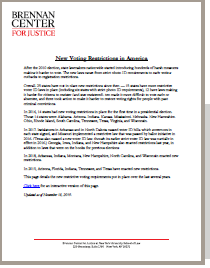 Voting laws enacted by states can be restrictive. After the 2010 election, many states passed harsh measures that made it harder to vote, including photo ID requirements and registration restrictions. The Brennan Center for Justice detailed restrictions enacted in 25 states since 2010: (https://bit.ly/33mfCVi). We have reprinted them here. You can also access an interactive map at: https://bit.ly/2FEYp0U
Voting laws enacted by states can be restrictive. After the 2010 election, many states passed harsh measures that made it harder to vote, including photo ID requirements and registration restrictions. The Brennan Center for Justice detailed restrictions enacted in 25 states since 2010: (https://bit.ly/33mfCVi). We have reprinted them here. You can also access an interactive map at: https://bit.ly/2FEYp0U
Alabama
- New restriction(s) in place in the first time in 2016: Photo ID required to vote. Click here to see the types of ID required under Alabama’s law.
Arizona
- New restrictions enacted in 2019: Restrictions on access to emergency early and absentee voting and extension of voter ID requirements to early voting. New restriction(s) in place for the first time in 2016: Limitations on mail-in ballot collection.
Arkansas
- New restriction enacted in 2018: Arkansas voters enacted a constitutional amendment, via ballot initiative, that enshrined a photo ID requirement for voting in the state constitution. Requires that voters show one of a limited set of IDs. Click here to see the types of ID required under Arkansas’s law.
Florida
- New restrictions enacted in 2019: Cut back on the expansive changes made by Amendment 4 – a constitutional amendment that restores voting rights to many Floridians with a felony conviction and that was passed overwhelmingly by Florida voters in November 2018. A federal 3 district court, however, has issued a partial preliminary injunction against the cutback, ruling that it is unconstitutional for Florida to condition the restoration of voting rights on legal financial obligations that a returning citizen cannot afford to pay. (For additional information, click here.)
- Restriction(s) in place for the first time in 2012: Cut early voting, curbed voter registration drives, and made it harder to restore voting rights to people with past criminal convictions.
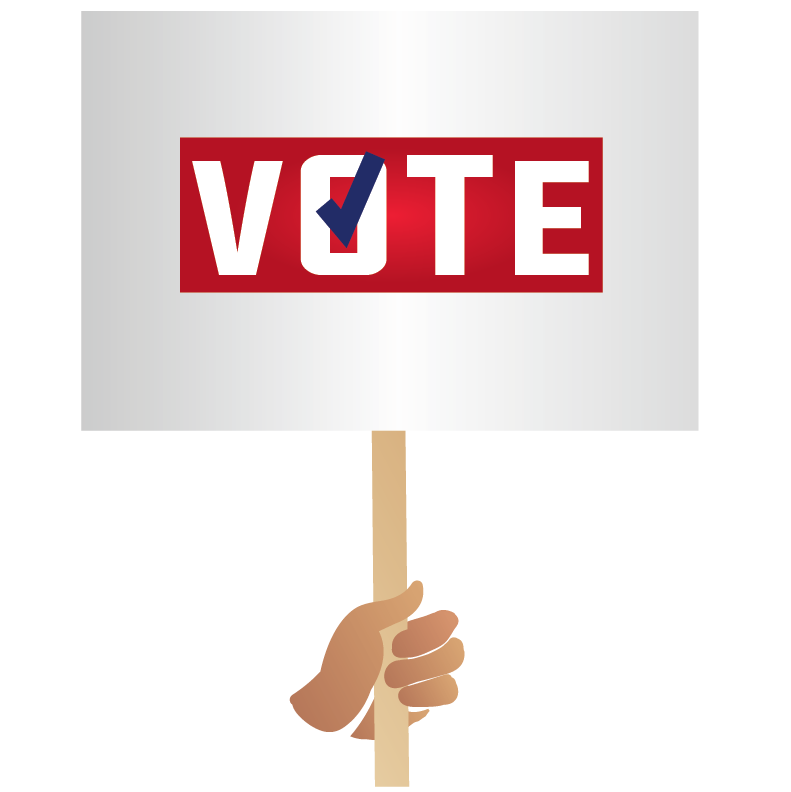 Georgia
Georgia
- New restriction(s) in place for the first time in 2018: The state legislature passed, and the governor signed a bill that would make voter registration more difficult. It imposes a requirement that voter registration forms match exactly with other state records — a burdensome process known as “no match, no vote.” In 2019, however, Georgia enacted HB 316, which largely ended the “no match, no vote” policy.
- Restriction(s) in place for the first time in 2012: Reduced early voting period from 45 to 21 days and cut early voting the weekend before Election Day.
Illinois
- Restriction(s) in place for the first time in 2012: Curbed voter registration drives. Original effective date: 2011
Indiana
- New restrictions enacted in 2019: Cut deadline for submitting an absentee ballot application for most voters from eight days to 12 days prior to the election and restricted state court lawsuits to extend polling place hours.
- New restriction enacted in 2017 and 2018: In 2017, the state enacted a law to implement a flawed voter purge process. The law provides for use of the error-prone Crosscheck Program to remove voters without the notice and waiting period required by the National Voter Registration Act. (The law was amended in 2018, but the state failed to fix the law’s failure to require notice to voters prior to purging them as mandated by federal law.) Civil rights groups sued the Secretary of State over the law in August 2017, and a court entered a preliminary injunction against the state in June 2018, meaning the law is currently not in effect. In 2019, the Seventh Circuit affirmed the preliminary injunction.
- New restriction(s) in place for the first time in 2016: Allows additional party-nominated election officers to demand voters provide proof of identification.*
- * This law subjects voters to an additional and duplicative voter identification requirement that did not exist before the law was enacted. If, however, precinct election officials always enforce the voter ID requirement in a uniform manner, this law may not have a restrictive effect.
Iowa
- New restrictions (partially) in place in 2018: Iowa’s governor signed a broad-based law that will require voter ID (starting after the 2018 election), restrict voter registration efforts, and impose new burdens on Election Day registration and early and absentee voting. Although not as restrictive as a North Carolina law that passed in 2013 (and was blocked by a federal court), Iowa’s law similarly restricts voting in several different ways.
- In 2019, following a trial, an Iowa state court largely upheld the law, but struck down its absentee ballot signature-matching provisions and modified other provisions related to voter ID and absentee voting. (For additional information, click here.)
- Restriction(s) in place for the first time in 2012: Made it harder to restore voting rights to people with past criminal convictions. Original effective date: 2011
 Kansas
Kansas
- Update since 2016: In 2018, a federal district court struck down the state’s documentary proof of citizenship law. That decision is on appeal.
- New restriction(s) in place for the first time in 2016: Documentary proof of citizenship required to register using the state registration form. But, by court order, certain individuals who registered without showing documentary proof must be permitted to vote.
- Restriction(s) in place for the first time in 2012: Photo ID required to vote. Click here to see the types of ID required under Kansas’s law.
Mississippi
- New restriction(s) in place for the first time in 2016: Photo ID required to vote. Click here to see the types of ID required under Mississippi’s law.
Missouri
- New restriction (partially) in place in 2018: Missouri passed a new law that requires photo ID in order to vote, but permits voters to vote a regular ballot by presenting non-photo ID and signing an affidavit indicating that they do not possess photo ID. The voter ID requirement was challenged in federal court and was altered in part in October 2018: the court prohibited the state from requiring otherwise-qualified voters that lacked photo ID to execute the affidavit required by statute in order to vote.
Montana
- New restriction enacted in 2018: Montana voters enacted a new law, via ballot initiative, that will prevent civic groups and individuals (with certain exceptions) from helping others vote absentee by collecting and delivering their voted ballots.
 Nebraska
Nebraska
- New restriction(s) in place for the first time in 2016: Reduced early voting period.
New Hampshire
- New restriction (partially) in place in 2018: In 2017, the state enacted a law that would make it more difficult for students and others to register to vote, but that law was partially enjoined prior to the 2018 election. In 2018, the state enacted another law that would make it more difficult for students and others to vote, but it takes effect in 2019.
- New restriction(s) in place for the first time in 2016: Photo ID requested to vote. The law requires voters without acceptable ID to get photographed at the polls, and the photograph will be affixed to an affidavit. Click here to see the types of ID requested under New Hampshire’s law.
North Carolina
- New restriction enacted in 2018: North Carolina voters enacted a constitutional amendment, via ballot initiative, that enshrined a photo ID requirement for voting in the state constitution. The state legislature subsequently enacted implementing legislation, over the governor’s veto.
- New restriction (partially) in place in 2018: In 2018, the state enacted a law that requires uniform hours at early voting sites. The law has had the effect of reducing the number of early voting locations available to voters. (The law also cut the last Saturday of early voting before the election, but that provision was not in effect for the 2018 election and, in 2019, the state reinstated the last Saturday of early voting.)
North Dakota
- New restriction (partially) in place in 2018: The state’s governor signed a bill on April 25, 2017 that would restore a strict voter ID requirement in the state. That law was challenged in federal court, and it will be altered in part for the 2018 election. Specifically, the federal district court required the state to accept certain tribal identification not included in the law as voting ID. Click here to see the types of ID required under North Dakota’s law.
Ohio
- New restriction(s) in place for the first time in 2016: Cut early voting and changed absentee and provisional ballot rules.
Rhode Island
- New restriction(s) in place for the first time in 2016: Photo ID requested to vote. There is an affidavit alternative for voters without a photo ID. Click here to see the types of ID requested under Rhode Island’s law.
South Carolina
- New restriction(s) in place for the first time in 2016: Photo ID required if a voter has one, but an alternative is available for those who have a reasonable impediment to obtaining ID. Click here to see the types of ID required under South Carolina’s law.
South Dakota
- Restriction(s) in place for the first time in 2012: Made it harder to restore voting rights to people with past criminal convictions.
 Tennessee
Tennessee
- New restrictions enacted in 2019: Restrictions on third-party voter registration. A federal court, however, has temporarily halted those restrictions from going into place, pending a trial.
- New restriction(s) in place for the first time in 2016: Photo ID required to vote. Click here to see the types of ID required under Tennessee’s law.
Texas
- New restriction enacted in 2019: Cut back use of mobile early voting sites.
- New restriction in place since 2016 election: Photo ID required if a voter has one, but an alternative will be available for those who present a non-photo ID from a preset list and execute an affidavit claiming to have certain, enumerated reasonable impediments to obtaining photo ID. Reasonable impediment alternative is more restrictive than the alternative in place in 2016. Click here to see the types of ID required under Texas’s law.
- New restriction(s) in place for the first time in 2016: Photo ID required if a voter has one, but an alternative will be available for those who have a reasonable impediment to obtaining ID.
- Restriction(s) in place for the first time in 2012: Curbed voter registration drives.
Virginia
- New restriction(s) in place for the first time in 2016: Photo ID required to vote and limits on third-party voter registration. Click here to see the types of ID required under Virginia’s law.
West Virginia
- Restriction(s) in place for the first time in 2012: Reduced early voting period from 17 to 10 Days.
Wisconsin
- New restrictions enacted in 2018: In 2018, the state passed a law limiting the early voting period and codifying certain administrative practices related to voter IDs—despite a Court order halting the state’s 2011 and 2014 attempts to limit early voting. A federal district court has blocked these new provisions, however.
- New restriction(s) in place for the first time in 2016: Photo ID required to vote. Click here to see the types of ID required under Wisconsin’s law.
How States are Voting
| How States are Voting | ||
|---|---|---|
